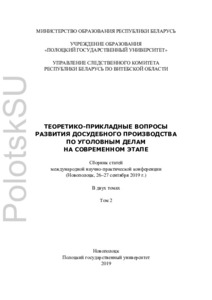Пожалуйста, используйте этот идентификатор, чтобы цитировать или ссылаться на этот ресурс:
https://elib.psu.by/handle/123456789/24307| Название: | Holding Delinquent Juveniles Accountable Through Peri-Judicial Practices, Mediation, and Family Group Conferences |
| Авторы: | Rahimi, K. Nikookar, H. |
| Дата публикации: | 2019 |
| Издатель: | Полоцкий государственный университет |
| Библиографическое описание: | Rahimi, K. Holding Delinquent Juveniles Accountable Through Peri-Judicial Practices, Mediation, and Family Group Conferences / K. Rahimi, H. Nikookar // Теоретико-прикладные вопросы развития досудебного производства по уголовным делам на современном этапе : сб. ст. междунар. науч.-практ. конф., Новополоцк, 26–27 сент. 2019 г. : в 2 т. / Полоц. гос. ун-т ; редкол.: И. В. Вегера (отв. ред) [и др.]. – Новополоцк, 2019. – Т. 2. – С. 153-164 |
| Аннотация: | An important objective of the criminal justice system with respect to delinquent juveniles, in addition to correction and re-socialization, is making them accountable. Juvenile accountability as reflected in this study through specific principles rooting in theories of criminology and philosophical and penological bases, depends on development and application of alternative practices that are different from those traditionally used by the criminal justice system in responding to a criminal phenomenon. Therefore, to hold delinquent juveniles accountable one needs to turn to responses that can desirably make an offender aware of unfavorable consequences of his criminal acts and motivate him to redress damages that have resulted from those acts. The present paper is an attempt to discuss two effective ways of treating delinquent juveniles, namely mediation in criminal processes and family group conferences, to help them take responsibility for their criminal acts and try to make up for the consequences of those acts. The goal is to identify methods of holding delinquent juveniles accountable in the Iranian criminal justice system that have emerged as a result of ineffectiveness of punishments in correction and re-socialization of delinquent children and in the light of new ways proposed by restorative justice for treating this group of offenders. These practices have been influenced by criminological approaches including reintegration shaming, the principle of criminal law as the last and least resort, right to not to be punished, etc. Drawing on descriptive-analytical findings and desk research, the present study has found that delinquent juveniles can be hold accountable by shifting away from traditional responses of the criminal justice system and towards practices recommended by restorative justice, including family group conference and mediation as means of informing delinquent juveniles of the consequences of their behaviors. On the other hand, these practices place offenders in a process where they become accountable for the offenses they committed by realizing how they failed to act humanely and by learning how to behave properly. |
| Ключевые слова: | Государственный рубрикатор НТИ - ВИНИТИ::ОБЩЕСТВЕННЫЕ НАУКИ::Государство и право. Юридические науки Наука уголовного процесса и практика применения уголовно-процессуального закона Accountability Responsibility Restitution Mediation Family group conferences |
| URI (Унифицированный идентификатор ресурса): | https://elib.psu.by/handle/123456789/24307 |
| Располагается в коллекциях: | Теоретико-прикладные вопросы развития досудебного производства по уголовным делам на современном этапе. Том 2. 2019 |
Файлы этого ресурса:
| Файл | Описание | Размер | Формат | |
|---|---|---|---|---|
| Rahimi K., Nikookar H.-153-164.pdf | 810.54 kB | Adobe PDF |  Просмотреть/Открыть |
Все ресурсы в архиве электронных ресурсов защищены авторским правом, все права сохранены.